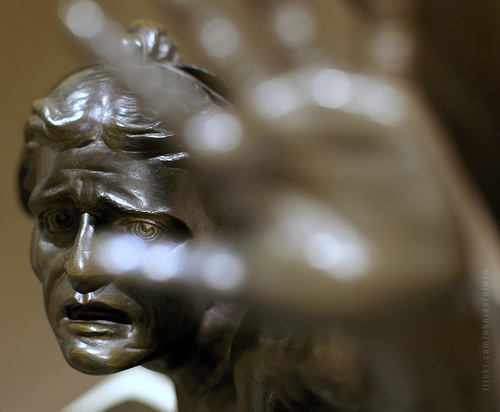We run our website the way we wished the whole internet worked: we provide high quality original content with no ads. We are funded solely by your direct support. Please consider supporting this project.

Why Did God Allow Evil?
Is it possible to force people to love? Powerful people may be able to force others to do just about anything. Through psychological or physical torture, they may succeed in forcing them to curse their own children to deny their faith. They may even succeed in forcing others to act and say loving things to them. But no one can force another person to actually love them.
But God created us, someone might respond, so he need not coerce us to love him. He could simply create us with an unquenchable desire to love him. In this case we would choose to love God simply by virtue of how we were created. I suggest that this supposition also conflicts with our experience.
Consider this analogy: Suppose I were able to invent a computer chip that could interact with a human brain in a deterministic fashion, causing the person who carries the chip to do exactly what the chip dictates without the person knowing this. Suppose further that I programmed the chip to produce “the perfect wife” and inserted it in my wife’s brain while she was sleeping. The next morning she would wake up as my idea of a perfect wife. She would feel, behave and speak in a perfectly loving fashion. Owing to the sophistication of the chip, she would believe that she was voluntarily choosing to love me in this fashion, though in truth she could not do otherwise.
Would my wife genuinely love me? I think not. Proof of this is that I (and hopefully all husbands) would eventually find this “love” unfulfilling. I would know that my wife was not experiencing these loving feelings or engaging in this loving behavior on her own. In reality, I would simply be acting and speaking to myself through this sophisticated computer chip. My wife’s behavior would not be chosen by her, so she would not really be loving me at all. She would become the equivalent of a puppet. If I want love from her, she must personally possess the capacity to choose not to love me.
If God desires a bride made up of people who genuinely love him (see Jn 17)—who do not just act lovingly toward him—he must create people who have the capacity to reject him. He must endow agents with self-determination. They, not he, must determine whether or not they will love him and each other. And this, I submit, explains why God created a world in which evil was possible. If love is the goal, it could not be otherwise. God chose to create a world in which evil is possible only in the sense that he chose to create a world in which love is possible. The possibility of evil is not a second decision God makes; it is implied in the single decision to have a world in which love is possible. It is, in effect, the metaphysical price God must pay if he wants to arrive at a bride who says yes to his triune love.
—Adapted from Satan and the Problem of Evil, pages 54-55
Image by RocPX via Flickr
Category: Q&A
Tags: Evil, Free Will, Love, Problem of Evil, Satan and the Problem of Evil
Topics: Providence, Predestination and Free Will, The Problem of Evil
Related Reading

How do you respond to Acts 2:23 and 4:28?
Question: Acts 2:23 and 4:28 tell us that wicked people crucified Jesus just as God predestined them to do. If this wicked act could be predestined, why couldn’t every other wicked act be predestined? Doesn’t this refute your theory that human acts can’t be free if they are either predestined or foreknown? Answer: In Acts…

Love and the Other Attributes of God
If we keep our focus on Christ, we see that God’s power and God’s love are not two separate attributes, as many people assume. As I often state, love is not merely something God does; love is what God eternally is. Everything God does, therefore, expresses perfect love. God’s power, therefore, is simply an aspect…

The Logical Hexagon Made Simple
by: Greg Boyd The Hexagaon in a Nutshell For those of you who don’t have the twenty to thirty minutes it will probably take to read this essay but who nevertheless would like to have some idea of what the Logical Hexagon is all about, here is my two sentence elevator speech: The Logical Hexagon…

Life and Death in Haiti
Sometimes it’s important to hear about other lives, much sadder and difficult than our own, to reorient us to what is most important. In this season of elections that can be so divisive and in an economy that seems so fragile and creates hardship for many of us, it’s important to remember that we are…

5 Differences Between The Kingdom of God and the Kingdom of the World
Image by matthijs rouw via Flickr The kingdom of God looks and acts like Jesus Christ, like Calvary, like God’s eternal, triune love. It consists of people graciously embracing others and sacrificing themselves in service to others. It consists of people trusting and employing “power under” rather than “power over,” even when they, like Jesus, suffer because…

Revolting Against Classism
All fallen societies and religions have a tendency to rank people according to class. All have ways of separating the insiders from the outsiders, the holy from the unholy and the more important people from the less important people. Jesus revolted against classism by the way he lived, a way defined by the Kingdom. Now,…
